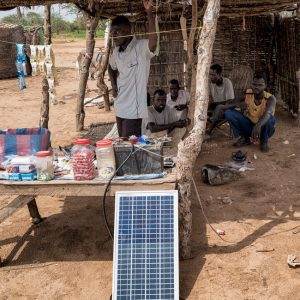A huge investment by the IKEA Foundation is set to showcase the power of renewable energy for refugees. It will change culture towards entrepreneurship and reducing dependency on aid. The new project will be implemented by Practical Action and UNHCR.

Access to renewable energy is set to transform life for displaced people
A ten million Euro investment over the next three years will bring renewable energy to refugees and their host communities’ homes, schools, clinics and businesses.
The project in Rwanda and Jordan will create access to off-grid, renewable energy for thousands of displaced people.It will enable them to start businesses, improve their health and education, save time and will contribute to helping people in camps gain economic independence and overcome dependence on aid.
It will be funded by the IKEA Foundation and implemented by Practical Action and UNHCR, the UN Refugee Agency, in three camps in Rwanda and Irbid city in Jordan, where people fleeing conflict and civil unrest in Syria and the DR Congo have settled.
Experts from UNHCR, Practical Action and its implementing partner the Norwegian Refugee Council will work with refugee entrepreneurs, private energy companies, host communities, refugee families and national governments.
Initially, they will identify what problems refugees face and potential solutions to them. They will then help camp authorities and displaced communities implement them whilst ensuring the project will have significant long-term impact.
Practical Action CEO Paul Smith Lomas said: “This is a fantastic example of the way in which aid should be delivered for long-term benefit. We know the vast majority of people want to take control of their lives and provide for their families, but very often they simply don’t have the tools, skills or opportunity to do so.
“This project is typical of the way in which Practical Action works. We find out what people need and work with them to develop solutions that will free them from poverty. In this case, by working in this partnership, we believe we’ll find the best and most sustainable solutions.
“Truly great development work only happens when solutions to problems can be replicated by other actors such as national governments, the private sector and the communities themselves, without the need for further input from charities like Practical Action, so that ultimately millions benefit. This is what we want to achieve from this project.”
The project will bring renewable energy for street and home lighting, cooking and powering tools and appliances, allowing entrepreneurs to flourish.
The situations refugees in Jordan and Rwanda find themselves in are vastly different, but the project will demonstrate how access to energy can transform people’s lives, whatever their circumstances.
Access to safe and reliable energy for everyone is one of the Sustainable Development Goals agreed by global leaders. Without energy, refugees struggle to rebuild their lives and remain reliant on aid.
UNHCR Chief, Private Partnerships and Philanthropy a.i. Tapio Vahtola said: “The Renewable Energy for Refugees project shows how new approaches and new strategies can mobilise an effective response and pursue sustainable solutions to forced displacement.
“To give refugees access to clean and affordable energy, to give them an opportunity to change their future for the better, we need to work together. Through individuals, NGOs, private sector, governmental institutions and UN agencies drawing on complementary skills and contributing with funding, technical expertise, creativity, and innovation.”
Stats
- There are currently 22.5 million refugees worldwide and over half are under the age of 18. (UNHCR, Global Trends Forced Displacement 2016)
- Out of 8.7 million refugees and displaced people in camps, only 11% have access to reliable energy sources and lighting and the cost of energy is high. (Chatham House report for the Moving Energy Initiative, Heat, Light and Power for Refugees 2015)
- The average displaced household will spend at least $200 per year on fuel, which amounts to $2.1 billion each year worldwide. (Chatham House report for the Moving Energy Initiative, Heat, Light and Power for Refugees 2015)
- Using the best available green technologies for households could save lives, reduce CO2 emissions by 11.38 million tons per year, and improve living standards. (Chatham House report for the Moving Energy Initiative, Heat, Light and Power for Refugees 2015)
- The project will be working with 10,000 refugees in Irbid, Jordan. Those set to benefit from the project are predominantly Syrian and have fled the civil war in their own country. Many now live with local families. They face high unemployment and low job prospects.
- In Rwanda, the project will work with 50,000 refugees in the Kigeme, Nyabiheke, and Gihembe refugee camps. Refugee communities are Congolese and have fled the civil war and internal conflict. There is currently very little energy infrastructure.